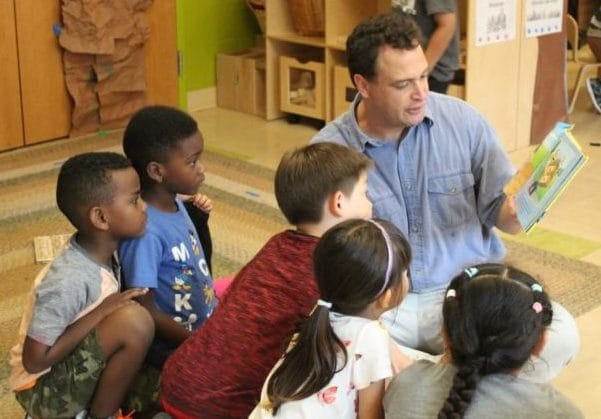
Inspired Teaching spoke with Antone Neugass, Inspired Teaching Fellow (‘17) to learn about his experience co-teaching Kindergarten during summer school at Capital City Public Charter School. Antone recently began his first year as a teacher of record at Creative Minds International PCS.
Why did you decide to become a teacher?
Early on in my professional career, I worked as a park ranger, working with high school students on conservation issues. Later on, I worked as a grant writer in the environmental field and in nonprofit management. I felt a strong need to get back to that early experience of working with people, not sitting behind a computer.
Those early jobs were probably some of the most fulfilling and intellectually stimulating ones I’d had. I love the experience of learning and growing with kids. When I worked with high school students, helping them learn to collaborate as a team, and getting to see them grow from that experience, was exciting. Combined with the fact that I have a 6-year-old daughter, this all made me want to head toward the field of education.
I realized I wanted to be in the classroom. I wanted to be a good teacher, not just a teacher and I felt Inspired Teaching would give me those tools.
What attracted you to Inspired Teaching’s Residency model?
The residency aspect of the program was a big selling point because I’m very much an experiential learner. Beyond a couple months of student teaching, I wanted to see the entire duration of a school year. I felt that would really be beneficial in shaping my teaching pedagogy.
I wouldn’t have necessarily chosen early childhood, but it turned out to be a really great fit. One of the things I really love about the 4-7-year-old range is that kids are incredibly curious and excited about everything in the world. Helping them explore their interests has proven to be really exciting.
Looking back at your own experiences in school, what is something you hope to make different for your students?
As a new teacher, one of the hardest things to master is learning how to differentiate lessons for the diversity of learning needs. While I had classes and teachers who did that, I also had more traditional teachers who stood in front of the class and used only direct instruction. I want to learn to incorporate differentiation in my classroom so I really can help kids who have tremendous assets in different areas realize their potential.
What is something that has surprised you about Summer School so far?
One of the things that surprised me most was having to establish strong relationships and build trust with my students in a such a compacted timeframe. I don’t think I appreciated how challenging that would be, but I think we succeeded a fair bit in developing good relationships. You have to establish connections quickly, and identify areas where they are struggling, and identify their strengths.
Every classroom throughout summer school chooses a theme related to STEM to orient the students’ learning. Describe the theme your classroom chose and why it has been a powerful learning experience for your students.
We chose construction and the most powerful thing about that theme is that construction really is a creative process. We have really focused on each step: You envision what you want to build, you research it, then you plan and design it on paper. Afterwards you build it and finally you revise it. Watching the children go through each step, and think carefully as they decide to make adjustments, is rewarding and fascinating.
In your kindergarten classroom, your students are focusing specifically on developing structures that will make DC are more fair and interesting place to live. How has this specific focus pushed their learning and development?
This summer, we invited the summer school principal to challenge the students to create structures that will DC a more interesting and fair place for kids. We came up with a wide variety of things like things that would interest kids — like a volcano, and an ice cream store on every corner. We pushed them to think about things that they have access to that other kids don’t.
I think it’s important because especially in early childhood because the kids are very egocentric. They are very concerned about what is fair. It’s a great way for kids to start to learn that social emotional skill, and collaborate with others, and see other points of view. Fairness is a great window into expanding kids’ thinking.
When you think about the year ahead, what do you hope your students will learn in your classroom?
I want to give my students a strong foundation in language development, basic math and writing skills. That is my focus, but I want to do that in a fun and creative way. I also want my students to understand that people in school care about them and that school is a safe (and dare I say) enjoyable place to be.
